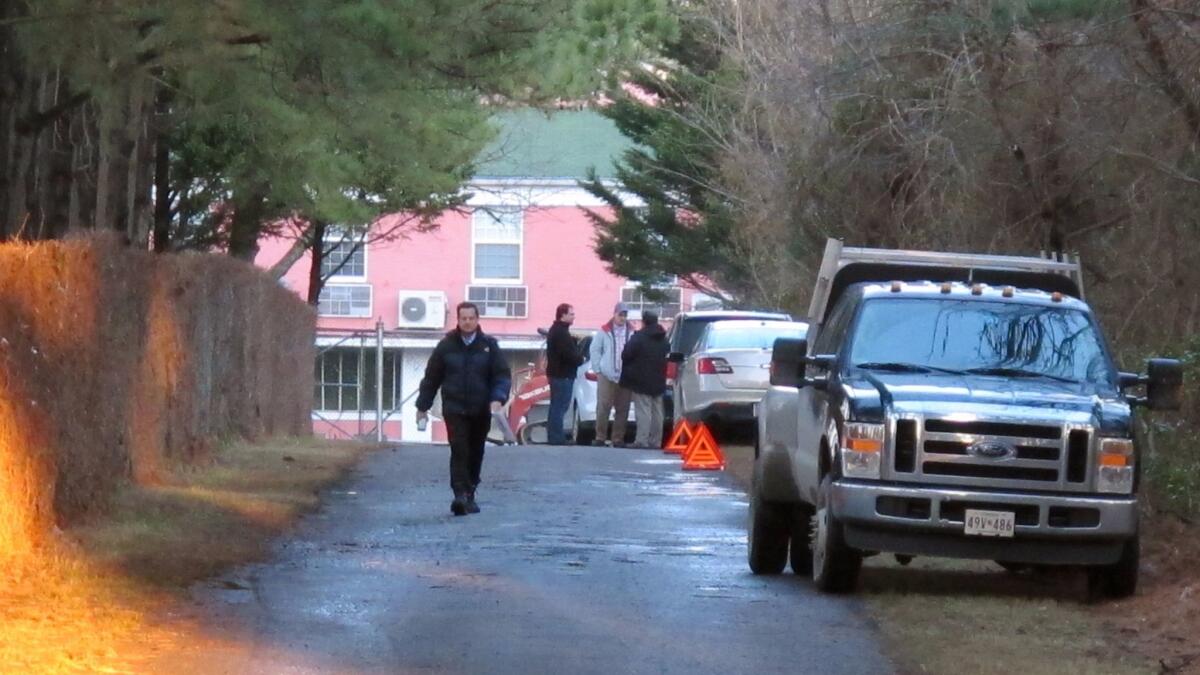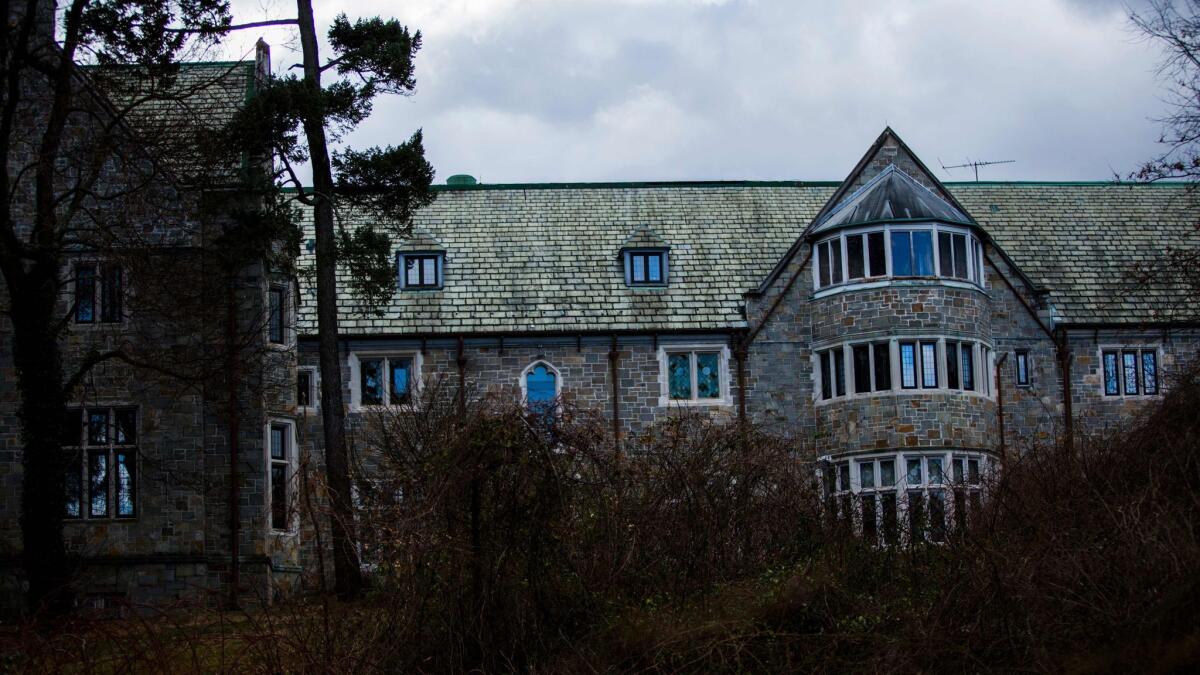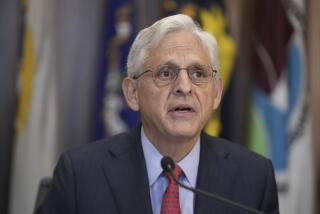Bought during the Cold War, Russian mansions in Maryland and New York suspected of housing spies

- Share via
It wouldn’t be a bad opening for a Tom Clancy novel about the Cold War:
Without warning, American agents descend on a Russian-owned compound in rural Maryland. A similar surprise unfolds at an estate on New York’s Long Island. Both locations are accused of hosting Russian spies on American soil, and once again, two nuclear powers stand at each other’s throats.
Except there’s no need to dramatize, nor any need to set the story in the past. All this happened Thursday, as American officials punished the Russian government on allegations of hacking Democratic officials to influence the recent presidential election.
The measures ordered by President Obama included the expulsion of 35 Russian diplomatic officials accused of working as intelligence officers, plus sanctions against Russian cyber agents and firms accused of supporting hacking of the Democratic National Committee.
But it’s Obama’s order to shut down two Russian-owned mansions — best known as quiet getaways for diplomatic apparatchiks — that has raised eyebrows the most.
On Maryland’s Eastern Shore, about 60 miles east of the nation’s capital, a three-story, red-brick mansion and almost a dozen cottages sit on the banks of the Corsica River.
The Soviet Union bought the property in 1972 and transferred it to the Russian Federation in the 1990s, and the 45-acre compound also holds tennis courts, a swimming pool and playground equipment. It’s mostly known to the local community of Centreville for hosting parties and sailing regattas on Labor Day, if it’s known at all.
“If you didn’t know they were here, you wouldn’t know they were here,” said George Sigler, president of Centreville’s town council and a retired Marine, describing the compound as a place where Russians working in the embassy in Washington could “come to let their hair down and relax.”
The ordered shutdown of the compound caught Sigler by surprise. He had never recalled hearing of anything suspicious happening there, nor of Russian guests misbehaving in the community, where they would shop, eat, get haircuts and buy groceries and alcohol; one local liquor store had stocked up on vodka to serve Russian customers.
Sigler recalled visiting the property for a Labor Day picnic last year and “drinking copious amounts of Russian vodka.”
Sigler said he mentioned to the Russian ambassador that he didn’t think he could get vodka like that in the U.S. The next day, a Russian aide arrived at Centreville City Hall with a couple of bottles.
“They’re good neighbors, and have been the whole time they’ve been there,” Sigler said.
After Obama ordered the compounds closed Thursday, a woman who flashed an FBI badge and a man who said he worked for the State Department shooed people away from the Maryland property, the Baltimore Sun reported. A 14-acre property in Upper Brookville, Long Island, was also ordered closed.
At a news briefing, Obama administration officials did not give details on what kind of spying allegedly happened at the compounds in Maryland and Long Island, except that they “were used for intelligence collection activities” as well as for recreation. (Part of the administration’s justification for the mansion closures included complaints that U.S. diplomats were being harassed and mistreated in Russia.)
Russian U.N. Ambassador Vitaly Churkin complained that the sites were popular getaways for diplomats’ families.
“I think it’s quite scandalous that they chose to throw out our kids,” Churkin said, according to the Associated Press. “They know full well that those two facilities they mentioned, they are vacation facilities for our kids, and this is Christmas, and this is vacation time for our schools. This is the time when the kids go to those facilities. So to close our access to them just while those holidays were starting, to me was rather silly.”
During the Cold War, the U.S. and Soviet Union restricted the movements of each others’ visiting diplomats, requiring them to stick to certain parts of the countries. A high-ranking Soviet defector, the diplomat Arkady N. Shevchenko, said at least one of the Russian-owned mansions on Long Island served double duty as electronic surveillance posts for the Soviet Union’s intelligence agency, the KGB.
“When I first came to the United States in 1958, there were three or four KGB communications technicians and their gear sharing the former servants’ quarters in the attic,” Shevchenko wrote of the Soviets’ Killenworth mansion on Long Island in a 1985 memoir, “Breaking with Moscow.”

“By 1973, the specialists in intercepting radio signals numbered at least a dozen, and they had taken over the whole floor,” wrote Shevchenko. “Their equipment occupied so much space, in fact, that one of the two large unused greenhouses had been commandeered to store it. These quarters were off limits to other personnel.”
Shevchenko, who died in 1998, also told the Norwich Bulletin newspaper that the Soviets were pleased after buying the Maryland compound in 1972 and added that the property’s location was “not accidental.”
“I’m not privy to the details, but I remember how happy they were when they bought this estate,” Shevchenko reportedly said.
If there was spying going on in Maryland, it may have gone both ways. Soviet officials once complained to U.S. officials that they found a special cable and a special device attached to the compound’s internal phone system in 1977.
On Friday, Russian President Vladimir Putin called the sanctions package “provocative and aimed at further weakening the Russia-U.S. relationship.”
But this was not the same old Cold War story. While Putin’s foreign minister had called for Russia to expel an equal number of American diplomats and close their dacha outside Moscow in addition to another facility, Putin said he would not retaliate, instead hoping to “restore Russian-U.S. relations based on the policies of the Trump administration.”
President-elect Donald Trump responded by pinning a congratulatory tweet to the top of his Twitter page: “Great move on delay (by V. Putin) - I always knew he was very smart!” The Russian embassy in the U.S., in turn, retweeted Trump’s message.
In Centreville, Md., comments on the residents’ Facebook page were mostly critical of Obama’s decision to shut down the Russian compound, according to Sigler, who also had his doubts about the spying claims.
“Were they spying on anybody? I wouldn’t know why. It’s just a sleepy little town on a sleepy little river,” Sigler said, adding, “Once this all blows over, they’ll probably come back.”
Email: [email protected]
Follow me on Twitter: @mattdpearce
ALSO
Russian malware found at Vermont electric utility
Yes, they really said that. From ‘love is love is love’ to ‘deplorables,’ notable quotes from 2016
In a slap at Obama, Putin plays Mr. Nice Guy
More to Read
Sign up for Essential California
The most important California stories and recommendations in your inbox every morning.
You may occasionally receive promotional content from the Los Angeles Times.











